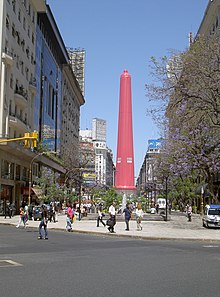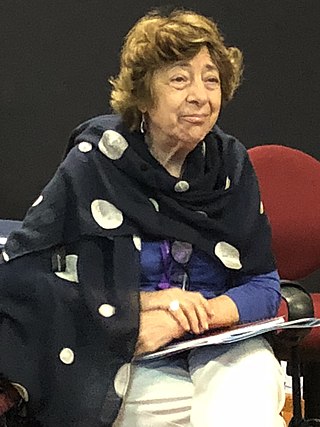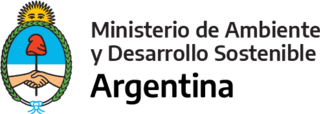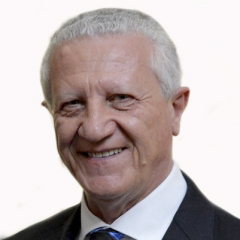
HIV/AIDS in Argentina was considered a concentrated epidemic by 2012.

HIV/AIDS in Argentina was considered a concentrated epidemic by 2012.
In 2019, UNAIDS estimates placed the number of people living with HIV at about 140,000. [1]
In 2010, the prevalence of human immunodeficiency virus (HIV) in the general population was less than 1%. In some groups the percentage was 6%, while in others there is a major incidence. Considering the whole country, 70% of cases are concentrated in the provinces of Buenos Aires, Santa Fe, Córdoba and the Autonomous City of Buenos Aires. [2]
In 1982 the first patient with AIDS was reported in Argentina. Since 1982, the Ministry of Health has kept records of cases. Until mid-2000, more than 17,000 patients (12,732 men, 3,074 women and 1,214 children under 15 years) were reported.
In 1987, it was reported the first case of a woman infected with HIV. [3]
In 2012, 5,500 new HIV cases were being reported in Argentina every year. 90% of them acquired the virus by having sex without a condom. [4]
In 2012, there were about 110,000 people infected with HIV in Argentina, of whom only 50% knew their status. Of these, 47,000 were under treatment, 69% in the public service and the rest covered by private health insurance plans. [4] [5]

National Route 9 is a major road in Argentina, which runs from the center-east to the northwest of the country, crossing the provinces of Buenos Aires, Santa Fe, Córdoba, Santiago del Estero, Tucumán, Salta and Jujuy. It starts on Avenida General Paz, which marks the border between the Autonomous City of Buenos Aires and the surrounding province of the same name, and ends at the Horacio Guzmán International Bridge, on the La Quiaca River, traversing 1,967 km (1,222 mi). The road is a limited access motorway from Buenos Aires to Rosario.

Lesbian, gay, bisexual, and transgender (LGBT) rights in Argentina rank among the highest in the world. Upon legalising same-sex marriage on 15 July 2010, Argentina became the first country in Latin America, the second in the Americas, and the tenth in the world to do so. Following Argentina's transition to a democracy in 1983, its laws have become more inclusive and accepting of LGBT people, as has public opinion.

The Ministry of Foreign Affairs, International Trade and Worship, informally referred to as the Chancellery, is the Argentine government ministry dealing with the foreign relations of Argentina, Argentina's foreign policy, international development, international trade, diaspora and matters dealing with Mercosur and the Catholic Church.
Cases of HIV/AIDS in Peru are considered to have reached the level of a concentrated epidemic.
Honduras is the Central American country most adversely affected by the HIV/AIDS epidemic. It is estimated that the prevalence of HIV among Honduran adults is 1.5%.

In March and April 2009, an outbreak of a new strain of flu, popularly known as swine flu was discovered to have infected several people in Mexico and the states of California and Texas in the United States. On April 28 Costa Rica became the first Central American country to report the outbreak of the virus, with a confirmed infection. As of November 4 the Costa Rican Ministry of Health had 1,596 confirmed cases, 1,275 pending cases, 8,000 already discarded, and 38 deaths.

The Ministry of Health of Argentina is a ministry of the national executive power that oversees, elaborates and coordinates the Argentine national state's public health policy. The ministry is responsible for overseeing Argentina's highly decentralized universal health care system, which according to 2000 figures, serviced over half of the country's population.

Daniel Gollán is an Argentine cardiologist and politician. He served as Health Minister of Argentina for a brief period during the presidency of Cristina Fernández de Kirchner in 2015, and as Health Minister of Buenos Aires Province from 2019 to 2021. Since 2021, he has been a National Deputy.

The Hospital of Psychiatric Emergencies Marcelo Torcuato de Alvear is a monovalent public hospital for acute psychiatric patients in the city of Buenos Aires, Argentina.

Claudia Pía Baudracco was an Argentine activist for the rights of women, sexual minorities, and LGBT people.

Mabel Bianco is an Argentine physician who has devoted her career to fighting for women's access to improved health services and sex education. In 1989, she established the Foundation for Studies and Research on Women, and has continued to serve as its president. She has been an activist in Latin America and the world, introducing policies addressing breast cancer, HIV/AIDS, reproductive rights and gender reform in the UN.

Jeanne Gapiya-Niyonzima is a human rights activist from Burundi. She is the chair and founder of the National Association for Support for HIV-Positive People with AIDS (ANSS) and was the first person from the country to publicly admit they had HIV.

The Ministry of the Environment and Sustainable Development of Argentina is a ministry of the national executive power that oversees the government's policy on environmental issues and promotes sustainable development.

Hilda Victoria Montenegro is an Argentine politician who has been a member of the Buenos Aires City Legislature since 2017 for the Kolina party.

Carla Vizzotti is an Argentine physician specialized in vaccine-preventable diseases. She was the Secretary of Health Access and Vice Minister of Health in Argentina's Health Ministry, working under Minister Ginés González García, until February 2021. She has been Minister of Health since 20 February 2021, following González García's resignation.

This article presents official statistics gathered during the COVID-19 pandemic in Argentina. The National Ministry of Health publishes official numbers every night.

Karina Verónica Banfi is an Argentine politician, currently serving as National Deputy elected in Buenos Aires Province since 2015. She is a member of the Radical Civic Union (UCR).

Jorge Emilio Sarghini is an Argentine economist and politician. Historically a member of the Justicialist Party, Sarghini has served in a number of political posts throughout his career, most notably as a member and president of the Buenos Aires Province Chamber of Deputies, as Minister of Economy of Buenos Aires Province during the successive administrations of Eduardo Duhalde and Carlos Ruckauf, and briefly as Secretary of Communications during Duhalde's interim presidency in 2002.
The presence of HIV/AIDS in Uruguay is an ongoing health concern for the population of that South American nation.